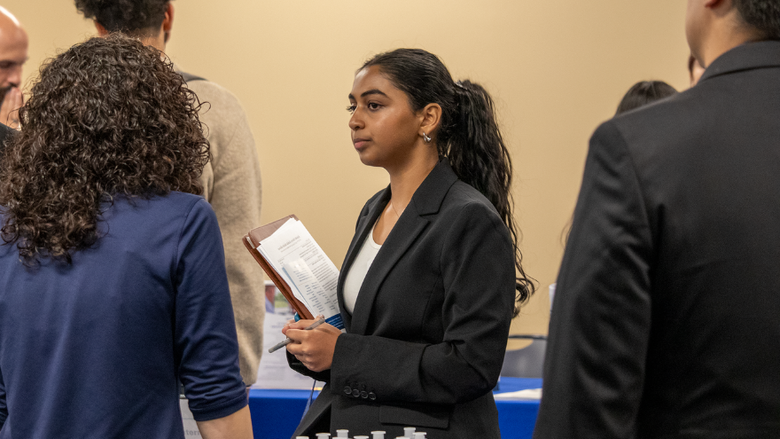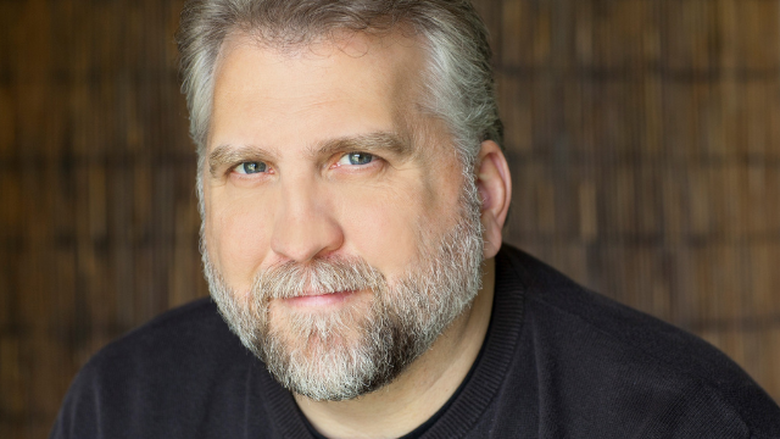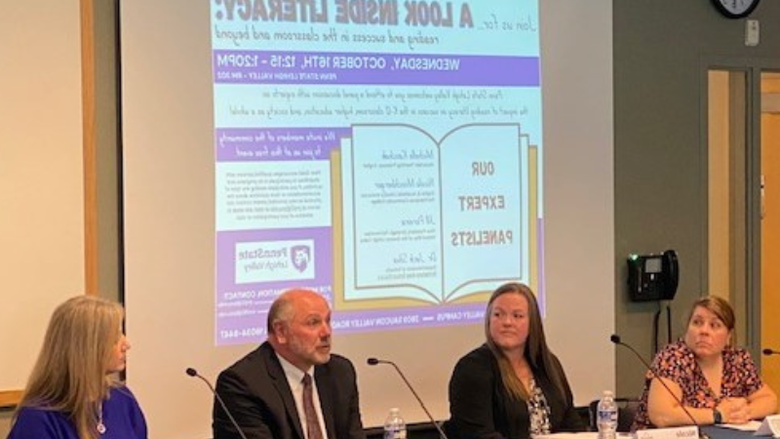
Five faculty and staff members from Penn State Lehigh Valley (PSU-LV) presented at the Fall 2024 Commonwealth Connections Instructor Days event, including; Larry Musolino, assistant teaching professor, mathematics; Jacqueline McLaughlin, professor of biology and CHANCE founding director; Anita Yuskauskas, associate teaching professor and program coordinator, health policy and administration; Andjela Kaur, assistant teaching professor, rehabilitation and human services; and Jen Jarson, head librarian.
CENTER VALLEY, Pa. — Faculty and staff from Penn State Lehigh Valley were among the slate of presenters and panelists at the annual Commonwealth Connections Instructor Days, a virtual event whose goal is to share strategies and tools for success in teaching. Faculty and staff from across Penn State exchanged ideas, teaching methods, and best practices with their colleagues ahead of the fall semester.
An advocate for open educational resources, Larry Musolino, assistant teaching professor, mathematics, co-presented “Amplifying OAER: Collaborative Approaches for Expanding Open Educational Resources at Penn State” with Michael Yatauro, Penn State Brandywine.
“I presented on a process to help instructors in disciplines such as math, physics, chemistry share open resources for different courses," Musolino said. "By surveying, documenting, and sharing the OER resources in use across all Penn State campuses, this can help faculty expand or revise their courses to include open resources."
Musolino’s presentation focused on how to set up this type of survey for a given discipline, send it out to faculty, gather the responses, share it at faculty meetings, and disseminate resources within the discipline.
“I really like these Instructor Day meetings because they’re a good way to share ideas among faculty at other campuses. We don’t get to interact much with other campuses, so this is one of those opportunities to hear what others are doing and get new ideas,” he said.
A partnership that blends the research talents of PSU-LV students with a leading London-based biotech company, AMSBIO, was the focus of “Innovative Learning and Sustainable Solutions to Societal Challenges” presented by Jacqueline McLaughlin, PSU-LV professor of biology and CHANCE founding director.
“This partnership is going stupendously,” McLaughlin said. “Students are researching the cellular and molecular components of the cardiovascular endothelium — the inner lining of our blood vessels that is directly involved in blood flow, inflammation, blood clotting, and the movement of life sustaining fluids. Numerous cardiovascular diseases are related to endothelial dysfunction. Presently, they [students] are culturing aortic endothelial cells and investigating the optimal substrate(s) to growth them on to study their outer layer — the glycocalyx.”
She added, “AMSBIO has and continues to empower our students research by gifting them with expensive reagents needed for their research and sharing their expertise in immunofluorescent staining of membrane molecules. We are reciprocating by providing them with our data, and just as excitingly, future student interns who are trained in cell culture research and have the potential to fill valuable positions in the (BioTech) industry."
About the Commonwealth Connections event, McLaughlin said, “It’s good to share out-of-the-box teaching practices, such as a biology lab’s partnership with a biotech company, that are transformational. We should constantly embrace and enhance new ways to teach our students that help them not only garnish skills and navigate the job market, but positively impact society.”
Anita Yuskauskas, associate teaching professor and program coordinator, health policy and administration, shared insight about artificial intelligence (AI) as it relates to student engagement and assessment in “Redefining Learning with AI: Strategies, Challenges, and Successes,” co-presented with Nonna Sorokina, assistant professor of business and finance, Penn State Scranton.
“AI is an emerging technology area, and my presentation had to do with an assignment in the HPA policy course. The students have to write a policy brief where they research both sides of a health policy debate and decide which side makes the most compelling argument. Every HPA student across the University does the same assignment using the same rubric,” Yuskauskas said. “In my course, students repeat the assignment using ChatGPT. Afterwards, they analyze the results and engage in a discussion with other students in the course.”
One of the goals of the assignment is to determine how frequently students use AI in their studies. “It was surprising to learn students aren’t using it as much as we think they are,” Yuskauskas said, yet it’s the next “must have” skill set for employment. “We have a responsibility to students to make sure they’re not walking out of here with a 4-year degree without some exposure about what AI is.”
Andjela Kaur, assistant teaching professor, rehabilitation and human services, and Jen Jarson, PSU-LV head librarian, gave a co-presentation on RHS 402: Children and Families in Rehabilitation Settings, a course they co-taught in spring 2024.
“Andjela and I worked together over the course of a few different semesters on ways to improve student engagement on inquiry in general,” Jarson said. “She invited me into her courses as a collaborator in different ways in the first few iterations. The third time we worked together, we fully co-taught the course in spring 2024.”
The presentation focused on how the instructors used the “open syllabus” concept, prioritizing student agency and active/experiential learning, as well as peer learning, into the course. The idea essentially gives students the ability to provide more input into how the course is designed and assignments are executed.
“The experience was really excellent,” Kaur said. “The idea is student-centered pedagogy, so students are part of the planning and execution of the learning and teaching together. It changes the power dynamic in the classroom. Students really kind of relaxed into the class, challenging the idea that the teacher is the most important person in the class. It puts students more in charge of their own learning. Students were making plans of how they were going to rewrite the assignment, or they would overhear another student talking about their ideas and think about how they may change their work based on the ideas of other students.”
The students benefited from the experience, Kaur said: “One student said in her reflection, ‘We have the freedom to work with our own ideas as long as we structure them in the proper way.’”
Jarson said, “We felt the open syllabus concept was a good way to foreground student agency — to bring into focus the process of learning rather than only the product of learning. We found it to be a valuable tool to try to accomplish our larger goals of student learning.”





